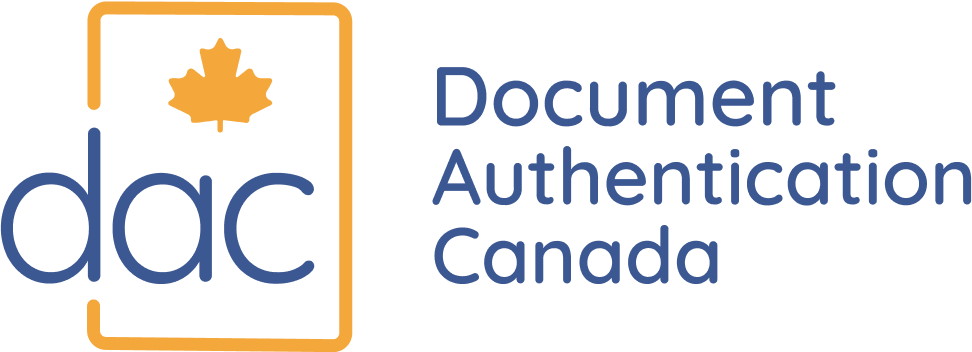Fast, Easy Document Authentication & Legalization at a Great Price!
- Fast authentication service → 1-3 days
- Easy to follow process with up to date step-by-step document tracking
- Great prices starting at just $90





Free Expert Document Review
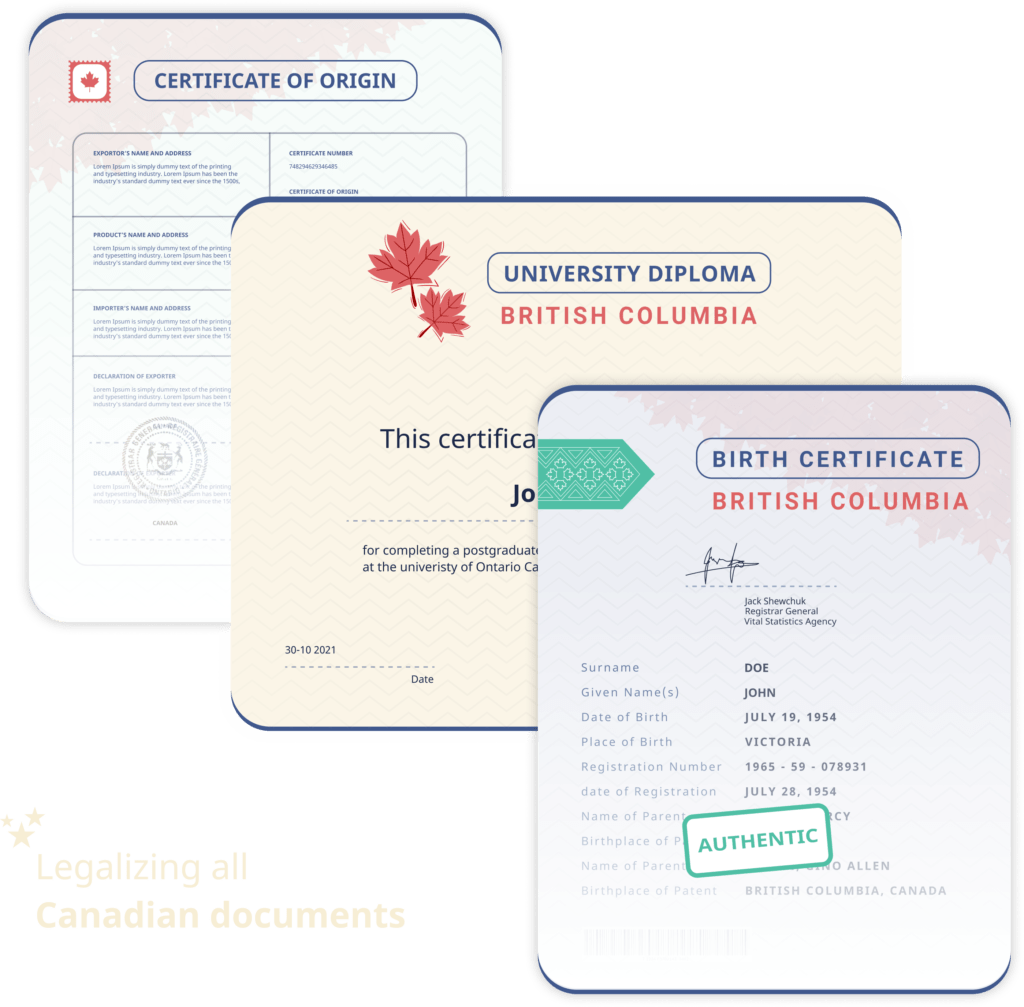
What is Document Authentication & Legalization?
To legitimately use a Canadian document outside of Canada, it must first be fully authenticated and legalized. The process is divided into 2 steps:
- Authentication: The validity of the document’s signature and stamp or seal are fully certified by Global Affairs Canada.
- Legalization: Once a document is authenticated, it’s then legalized by the embassy or consulate of the destination country, so that it can be recognized as a legal document in that country.
Read the most common questions we get about Authentication & Legalization
Fast Apostille Service
Avoid waiting up to 3 weeks at Global Affairs Canada. Authenticate your document in 1 to 3 days with our Express Authentication Service.
Fast Apostille Service
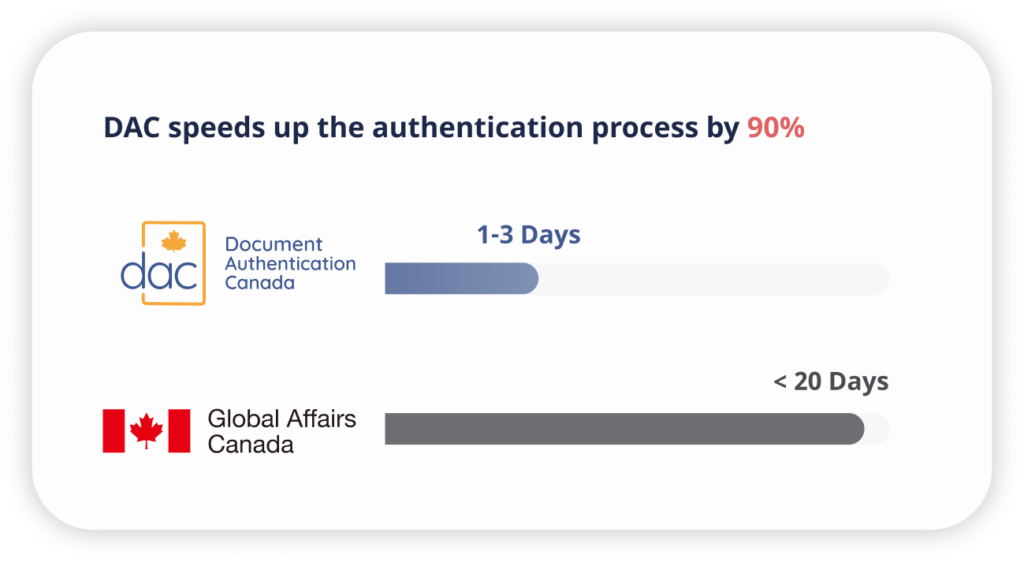
Great Price
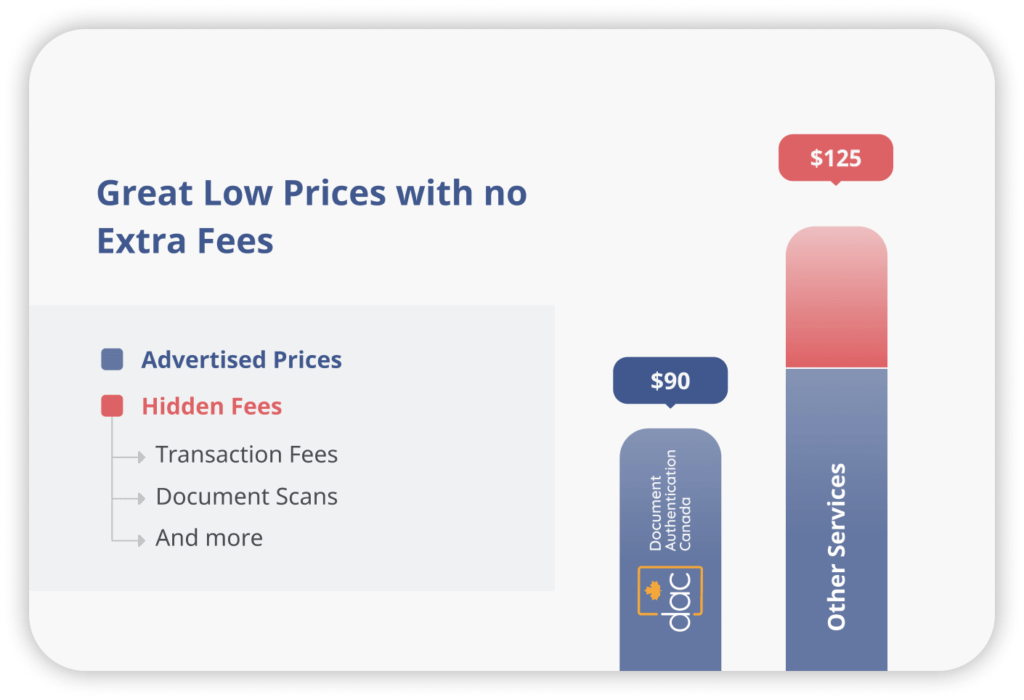
Great Price
With other services, you rarely end up paying the advertised price for certifying your documents.
What you don’t see are the sneaky fees that increase costs. Not with D.A.C, other than tax, what you see is what you pay.
Easy to Follow Process
Easy to Follow Process
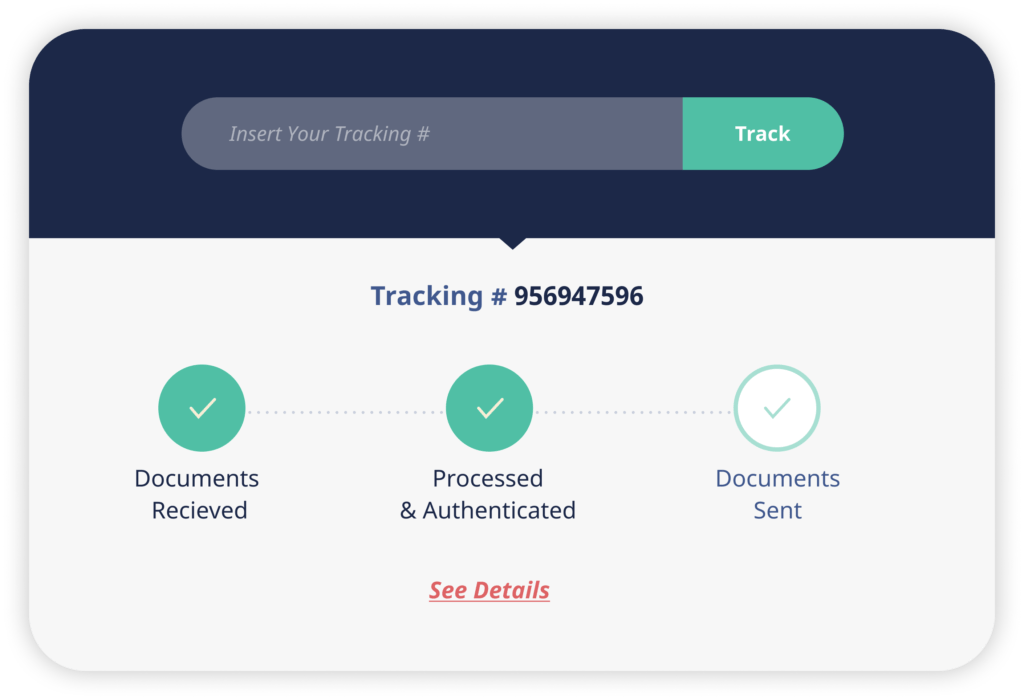
Our simple 4-step process helps you authenticate and legalize your Canadian documents in a fast & easy manner.
-
1
Request A Quote From Us -
2
Send Us Your Documents -
3
Let Us Process Your Documents -
4
Receive Your Documents
Start by calling us at 1-855-700-5840 or requesting a quote online. We’ll get back to you in 1 hour.
Not sure if your documents meet the requirements for authentication and legalisation? 👇
Reach out to our experts and receive a Free Document Evaluation.
Once you receive a quote and select a time frame that works best for you. We’ll provide you with a final price and help you prepare your documents. When your ready ship your documents to our office in Ottawa: 1103-467 Laurier West, Avenue Ottawa, Ontario, Canada, K1R 5C7.
We recommend that you use a secure, prepaid and tracked courier service for sending your documents.
Have any questions? Feel free to call us at 1-855-700-5840
After receiving your documents we will take care of the rest. We will make sure your documents get authenticated and legalized within your requested time frame.
Want to stay updated throughout the whole process?
Check out Document Authentication Canada’s Document Tracking System.
…and that’s it! After completing the document authentication and legalization process, we will send your documents using the shipping method of your choice.
Remember: With Document Authentication Canada you only pay at the end, once your documents have been completely authenticated and legalized.
I’ve hired them twice
Very happy with the speed of response with Nora and the team at DAC. I’ve hired them twice now, both times have been great. Thank you!"Would recommend to anyone!
Abdella Hasen was so easy to work with. Explained everything to me clearly and was patient with my questions. Was very quick to respond to my emails. This is a wonderful service that I would recommend to anyone!"Excellent service, great experience!
Needed to get documents legalized in Canada for the Netherlands. I had a great experience, perfect customer service, quick responses and fair price! Overall excellent and I would highly recommend them."Great service!
Great service! I very much appreciated all the quick and clear responses to my questions, and making this an easy process to have documents certified and legalized."Excellent experience
Excellent experience! Regular update on status, high punctuality. Will definitely use the service again and I recommend them to everyone!"Great customer service
This company provides great customer services. They are very friendly, helpful and responsive. The prices are good and the service is fast considering the delays from COVID that are out of their control."Explained the process very well
Explained the process very well! The process was easy and communication was fast. Payment was also quick and simple. Highly recommend!"Common Questions about Authentication and Legalization
1. What is an Apostille?
An Apostille is a certificate that authenticates the origin of a public document. It certifies the authenticity of the signature or seal of the person or authority that signed or sealed the public document and the capacity in which this was done.
Documents authenticated by a a Canadian competent authority are issued an apostille certificate (or “allonge”), a separate document securely affixed to the underlying authenticated document.
The first step to obtain an Apostille is document preparation, where the document is notarized or translated.
The second step is the Apostille itself. In Canada, Apostille certificates are issued by Global Affairs Canada and several provincial competent authorities.
Apostilles are only valid in countries that have signed the 1961 Hague Convention Abolishing the Requirement of Legalization for Foreign Public Documents.
Countries that are not signatory to this convention may ask for authentication and legalization, or an attestation.
At Document Authentication Canada we streamline this process, offering fast, accurate and secure Apostille, and authentication and legalization services for your Canadian documents. Get in touch with our team to help you get started!
2. How do I find out if I need an Apostille (or Authentication and Legalization)?
Most Canadian public documents intended for use in foreign countries have to be apostilled before they can be accepted by other jurisdictions. An Apostille confirms that the document was issued with authority and that the signature is genuine.
You will need an Apostille if all of the following apply:
– the country where the document was issued is party to the Apostille Convention
– the country in which the document is to be used is party to the Apostille Convention
– the law of the country where the document was issued considers it to be a public document
– the country in which the document is to be used requires an Apostille in order to recognise it as a foreign public document
If you’re using your documents in a country that is not party to the Apostille Convention, you will need an authentication and legalization, or an attestation.
Do you need help determining if your Canadian document needs to be apostilled? Call our team of experienced professionals on 1-855-700-5840 for a free consultation.
3. What type of documents can be apostilled?
Most Apostilles are issued for documents of an administrative nature, including birth, marriage and death certificates; documents emanating from an authority or an official connected with a court, tribunal or commission; extracts from commercial registers and other registers; patents; notarial acts and notarial attestations (acknowledgements) of signatures; and school, university and other academic diplomas issued by public institutions.
At Document Authentication Canada we offer fast, accurate, and safe document apostille services for a wide range of document types, including but not limited to:
| Personal Documents | Academic & Commercial Documents |
| Affidavit | Primary Secondary Diploma/Report Card |
| Birth Certificate | Teacher Certificate |
| Change of Name | University College Degree/Transcript |
| Death Certificate | Certificate of Origin |
| Divorce Certificate | Export |
| Marriage Certificate | Incorporation |
| Police Check | Regulatory Affairs |
| Power of Attorney |
Please contact our customer-first team to learn more about other eligible documents not listed above.
4. What is the difference between apostille, attestation, document authentication and legalization?
These terms are used to refer to processes where documents issued in one country are validated for use in another. While these options may seem similar, they are not interchangeable: making the wrong choice can mean your document is rejected by the foreign country you want to submit it in.
An apostille is a certificate issued and recognized in countries that have signed the 1961 Hague Convention. It’s a simpler process compared to a legalization as it only requires a single Apostille stamp. While Canada is a party to this Convention, not all states have joined. You can view a full list of countries that issue and recognize apostilles.
Document authentication is a process which determines if the signature, stamp or seal on a document is authentic. In other words, authentication validates the document’s authority. The process starts with a party signing the document and then having it acknowledged by a notary. The document is certified after the notarization is examined by a competent authority.
Once a document is fully authenticated, it must then be legalized by the country in which it will be used. This process is known as legalization and is done by the country’s embassy or consulate.
Countries in the Middle East and South Asia refer to legalization as attestation. Just like legalizations, an attestation is a step in the process of authenticating a document so that another country accepts it as genuine.
So, while an Apostille only requires a certificate issued by the state in which the document was created, legalizations and attestations involve a longer process where authentication in the document’s country of origin and a legalization or attestation by the country where it will be used are needed.
Also, an Apostille is recognized in all countries party to the Hague Convention. A legalization is only recognized in the country that issued it.
Apostilles and legalizations take time and effort and require in-person visits to consulates, embassies and government offices. This is where Document Authentication Canada can help. Our expert staff will see that your documents are properly authenticated and legalized, ready for use abroad. Call us today on 1-855-700-5840
5. I’m currently out of Canada. Do I need to travel to Canada to get my documents authenticated?
No, there is no need to travel to Canada to get your Canadian documents apostilled. Once we review your request and confirm that your documents meet all specified criteria, you can send them to our expert team at Document Authentication Canada at 1103-467 Laurier West, Avenue Ottawa, Ontario, Canada K1R 5C7.
Acting on your behalf, one of our expert agents visits Global Affairs Canada or a provincial competent authority to request an Apostille. We then follow up in person to ensure timely and accurate processing of your documents, saving you time and money on expensive trips to Ottawa.
Since you’re sending documents of high importance, we strongly recommend that you send all documents to our office using a secure, prepaid and tracked courier service such as Canada Post Xpress, DHL or FedEx.
If you have questions about your documents or the process, feel free to contact our staff at 1-855-700-5840
1. How long does it take to apostille (or authenticate and legalize) a document? Is there a rush authentication service available?
Document Authentication Canada offers quick turnaround times. We have a longstanding relationship with Canada’s Ministry of Foreign Affairs – Global Affairs Canada – ensuring that your documents are processed efficiently and securely.
That said, the time it takes to authenticate and legalize a document depends on various factors. For the documents to be ready for processing, they must meet all Global Affairs Canada and embassy requirements.
Inadequate documents will be declined and this means longer processing times. To prevent this, we will thoroughly check your documents before submission.
How long it takes to apostille a document also depends on when the documents arrive at our office and the opening hours at Global Affairs Canada and the embassy on that specific day. As an example, Global Affairs Canada is closed on Friday so documents which arrive on that day cannot be processed immediately.
Because of Global Affairs Canada operating rules, same day authentication services are currently not available.
Our express service takes 1 to 10 business days. It may take extra time to receive and send documents by mail.
2. How do I authenticate and legalize a document in Canada?
Authenticating and legalizing a Canadian document is a two-step process:
- Document Preparation: The document is notarized and translated (if it’s in a foreign language).
- In a notarization, a Notary Public witnesses the signing of the document and verifies the identity of the persons involved. Click here for more information on which documents require notarization.
- Translation is another step that prepares the document for use in another country – only certified translations are accepted for the purpose of apostille, authentication and legalization. Read more about this process here
- Apostille: The document is submitted to Global Affairs Canada or a provincial competent authority.
Notarization, translation, and getting an Apostille certificate is a lengthy process that can also be expensive. At Document Authentication Canada we take over the entire process for you, saving you time, money and the hassle of traveling to multiple appointments for each stage of the process. Contact us on 1-855-700-5840 for a free consultation.
3. Will I need to get my documents translated by a certified translator before requesting an Apostille or an authentication and legalization?
In most cases, yes. You will need a certified translation done by a sworn translator. The translator’s seal and signature confirm the validity of the certified translation.
Each province in Canada has its own separate entity for certifying translators. This page contains information on known and recognized associations across Canada.
At Document Authentication Canada, we can provide you with certified document translations into more than 70 languages, ensuring that your translated document meets international certified translation standards.
Call us on 1-855-700-5840 and we’ll help you prepare your document for use abroad.
4. Will I need to get my documents notarized before requesting an Apostille or an authentication and legalization?
Yes, but not all documents require notarization.
This is how to notarize documents in Canada:
- A Notary Public witnesses the signing of the document and verifies the identity of the persons involved.
- The Notary Public then places their signature and stamp on the document.
A notarization is a necessary first step to get your document apostilled or authenticated in Canada.
Documents which do not require notarization include:
- Original vital statistics documents such as long-form birth certificates, marriage and death certificates
- Criminal record checks
- Degrees or diplomas issued by accredited educational institutions where the signature and seal of the office of the register is clearly visible and includes full signature, name and title.
At Document Authentication Canada, we are continuously up-to-date with the latest compliance requirements.
Call us on 1-855-700-5840 and we’ll help you determine if your document needs to be notarized.
5. Can I apostille a photocopy of my documents instead of my original?
No, plain photocopies cannot be apostilled. Only certified true copies can be apostilled or authenticated, but this does not apply for all documents.
Get in touch with our expert team and we’ll help you determine if your photocopies can be apostilled.
6. What happens if my documents are declined?
Global Affairs Canada rejects documents that do not comply with their requirements. If this happens, you will have to review your documents and submit them again – of course, wasting a lot of time in the process.
Our expert team is here to ensure that this does not happen. We are continuously up to date with the latest compliance requirements and will help you prepare your documents for submission, including through our notary and certified translation services. We take care of the entire process for you so that you can get your apostilled or legalized documents back securely and without delay.
1. What are the fees for requesting an Apostille, or an authentication and legalization with DAC?
We pride ourselves on being transparent and on having no hidden fees. You can see our service prices here, but we encourage you to fill this form or call us at 1-855-700-5840 to get a personalized quote and a free document review within 1 hour.
The total cost of processing your documents will depend on several factors. As an example, consular fees may change depending on the embassy of the country where the documents need to be presented. Our Apostille and authentication fees may also differ depending on the urgency of the request. There are also additional costs to consider if your documents require translation, notarization, or if you need a certified true copy.
2. What payment methods do you accept?
We accept any credit or debit card, Paypal, e-transfer, direct bank deposit, certified check, Canadian money order, or international wire transfer. We will only process your payment after the documents have been Apostilled or authenticated and legalized.
3. To which address do I send my documents to?
Please send all documents to 1103-467 Laurier West, Avenue Ottawa, Ontario, Canada K1R 5C7. Before sending your documents, please make sure that we have reviewed your request and confirmed that your documents can be processed. If you are unsure, please contact us for a free document evaluation.
4. How can I track the documents after sending them to you?
Considering the level of importance that personal and business documents have, we strongly recommend that you send your documents to our office using a secure, prepaid and tracked courier service, such as Canada Post Xpress, DHL or FedEx.
We´ll notify you as soon as your documents arrive at our office. After that, you’ll be able to track your documents throughout the whole process using our Document Tracking System.
5. How does DAC return my documents?
After completing the authentication or Apostille process, we will send the documents back to you using the shipping method of your choice.
We highly recommend that you use a tracked shipping service to make sure that you know where your documents are at all time.
- Basic Information
- Requirements
- Costs
1. What is an Apostille?
An Apostille is a certificate that authenticates the origin of a public document. It certifies the authenticity of the signature or seal of the person or authority that signed or sealed the public document and the capacity in which this was done.
Documents authenticated by a a Canadian competent authority are issued an apostille certificate (or “allonge”), a separate document securely affixed to the underlying authenticated document.
The first step to obtain an Apostille is document preparation, where the document is notarized or translated.
The second step is the Apostille itself. In Canada, Apostille certificates are issued by Global Affairs Canada and several provincial competent authorities.
Apostilles are only valid in countries that have signed the 1961 Hague Convention Abolishing the Requirement of Legalization for Foreign Public Documents.
Countries that are not signatory to this convention may ask for authentication and legalization, or an attestation.
At Document Authentication Canada we streamline this process, offering fast, accurate and secure Apostille, and authentication and legalization services for your Canadian documents. Get in touch with our team to help you get started!
2. How do I find out if I need an Apostille (or Authentication and Legalization)?
Most Canadian public documents intended for use in foreign countries have to be apostilled before they can be accepted by other jurisdictions. An Apostille confirms that the document was issued with authority and that the signature is genuine.
You will need an Apostille if all of the following apply:
– the country where the document was issued is party to the Apostille Convention
– the country in which the document is to be used is party to the Apostille Convention
– the law of the country where the document was issued considers it to be a public document
– the country in which the document is to be used requires an Apostille in order to recognise it as a foreign public document
If you’re using your documents in a country that is not party to the Apostille Convention, you will need an authentication and legalization, or an attestation.
Do you need help determining if your Canadian document needs to be apostilled? Call our team of experienced professionals on 1-855-700-5840 for a free consultation.
3. What type of documents can be apostilled?
Most Apostilles are issued for documents of an administrative nature, including birth, marriage and death certificates; documents emanating from an authority or an official connected with a court, tribunal or commission; extracts from commercial registers and other registers; patents; notarial acts and notarial attestations (acknowledgements) of signatures; and school, university and other academic diplomas issued by public institutions.
At Document Authentication Canada we offer fast, accurate, and safe document apostille services for a wide range of document types, including but not limited to:
| Personal Documents | Academic & Commercial Documents |
| Affidavit | Primary Secondary Diploma/Report Card |
| Birth Certificate | Teacher Certificate |
| Change of Name | University College Degree/Transcript |
| Death Certificate | Certificate of Origin |
| Divorce Certificate | Export |
| Marriage Certificate | Incorporation |
| Police Check | Regulatory Affairs |
| Power of Attorney |
Please contact our customer-first team to learn more about other eligible documents not listed above.
4. What is the difference between apostille, attestation, document authentication and legalization?
These terms are used to refer to processes where documents issued in one country are validated for use in another. While these options may seem similar, they are not interchangeable: making the wrong choice can mean your document is rejected by the foreign country you want to submit it in.
An apostille is a certificate issued and recognized in countries that have signed the 1961 Hague Convention. It’s a simpler process compared to a legalization as it only requires a single Apostille stamp. While Canada is a party to this Convention, not all states have joined. You can view a full list of countries that issue and recognize apostilles.
Document authentication is a process which determines if the signature, stamp or seal on a document is authentic. In other words, authentication validates the document’s authority. The process starts with a party signing the document and then having it acknowledged by a notary. The document is certified after the notarization is examined by a competent authority.
Once a document is fully authenticated, it must then be legalized by the country in which it will be used. This process is known as legalization and is done by the country’s embassy or consulate.
Countries in the Middle East and South Asia refer to legalization as attestation. Just like legalizations, an attestation is a step in the process of authenticating a document so that another country accepts it as genuine.
So, while an Apostille only requires a certificate issued by the state in which the document was created, legalizations and attestations involve a longer process where authentication in the document’s country of origin and a legalization or attestation by the country where it will be used are needed.
Also, an Apostille is recognized in all countries party to the Hague Convention. A legalization is only recognized in the country that issued it.
Apostilles and legalizations take time and effort and require in-person visits to consulates, embassies and government offices. This is where Document Authentication Canada can help. Our expert staff will see that your documents are properly authenticated and legalized, ready for use abroad. Call us today on 1-855-700-5840
5. I'm currently out of Canada. Do I need to travel to Canada to get my documents authenticated?
No, there is no need to travel to Canada to get your Canadian documents apostilled. Once we review your request and confirm that your documents meet all specified criteria, you can send them to our expert team at Document Authentication Canada at 1103-467 Laurier West, Avenue Ottawa, Ontario, Canada K1R 5C7.
Acting on your behalf, one of our expert agents visits Global Affairs Canada or a provincial competent authority to request an Apostille. We then follow up in person to ensure timely and accurate processing of your documents, saving you time and money on expensive trips to Ottawa.
Since you’re sending documents of high importance, we strongly recommend that you send all documents to our office using a secure, prepaid and tracked courier service such as Canada Post Xpress, DHL or FedEx.
If you have questions about your documents or the process, feel free to contact our staff at 1-855-700-5840
1. How long does it take to apostille (or authenticate and legalize) a document? Is there a rush authentication service available?
Document Authentication Canada offers quick turnaround times. We have a longstanding relationship with Canada’s Ministry of Foreign Affairs – Global Affairs Canada – ensuring that your documents are processed efficiently and securely.
That said, the time it takes to authenticate and legalize a document depends on various factors. For the documents to be ready for processing, they must meet all Global Affairs Canada and embassy requirements.
Inadequate documents will be declined and this means longer processing times. To prevent this, we will thoroughly check your documents before submission.
How long it takes to apostille a document also depends on when the documents arrive at our office and the opening hours at Global Affairs Canada and the embassy on that specific day. As an example, Global Affairs Canada is closed on Friday so documents which arrive on that day cannot be processed immediately.
Because of Global Affairs Canada operating rules, same day authentication services are currently not available.
Our express service takes 1 to 10 business days. It may take extra time to receive and send documents by mail.
2. How do I authenticate and legalize a document in Canada?
Authenticating and legalizing a Canadian document is a two-step process:
- Document Preparation: The document is notarized and translated (if it’s in a foreign language).
- In a notarization, a Notary Public witnesses the signing of the document and verifies the identity of the persons involved. Click here for more information on which documents require notarization.
- Translation is another step that prepares the document for use in another country – only certified translations are accepted for the purpose of apostille, authentication and legalization. Read more about this process here
- Apostille: The document is submitted to Global Affairs Canada or a provincial competent authority.
Notarization, translation, and getting an Apostille certificate is a lengthy process that can also be expensive. At Document Authentication Canada we take over the entire process for you, saving you time, money and the hassle of traveling to multiple appointments for each stage of the process. Contact us on 1-855-700-5840 for a free consultation.
3. Will I need to get my documents translated by a certified translator before requesting an Apostille or an authentication and legalization?
In most cases, yes. You will need a certified translation done by a sworn translator. The translator’s seal and signature confirm the validity of the certified translation.
Each province in Canada has its own separate entity for certifying translators. This page contains information on known and recognized associations across Canada.
At Document Authentication Canada, we can provide you with certified document translations into more than 70 languages, ensuring that your translated document meets international certified translation standards.
Call us on 1-855-700-5840 and we’ll help you prepare your document for use abroad.
4. Will I need to get my documents notarized before requesting an Apostille or an authentication and legalization?
Yes, but not all documents require notarization.
This is how to notarize documents in Canada:
- A Notary Public witnesses the signing of the document and verifies the identity of the persons involved.
- The Notary Public then places their signature and stamp on the document.
A notarization is a necessary first step to get your document apostilled or authenticated in Canada.
Documents which do not require notarization include:
- Original vital statistics documents such as long-form birth certificates, marriage and death certificates
- Criminal record checks
- Degrees or diplomas issued by accredited educational institutions where the signature and seal of the office of the register is clearly visible and includes full signature, name and title.
At Document Authentication Canada, we are continuously up-to-date with the latest compliance requirements.
Call us on 1-855-700-5840 and we’ll help you determine if your document needs to be notarized.
5. Can I apostille a photocopy of my documents instead of my original?
No, plain photocopies cannot be apostilled. Only certified true copies can be apostilled or authenticated, but this does not apply for all documents.
Get in touch with our expert team and we’ll help you determine if your photocopies can be apostilled.
6. What happens if my documents are declined?
Global Affairs Canada rejects documents that do not comply with their requirements. If this happens, you will have to review your documents and submit them again – of course, wasting a lot of time in the process.
Our expert team is here to ensure that this does not happen. We are continuously up to date with the latest compliance requirements and will help you prepare your documents for submission, including through our notary and certified translation services. We take care of the entire process for you so that you can get your apostilled or legalized documents back securely and without delay.
1. What are the fees for requesting an Apostille, or an authentication and legalization with DAC?
We pride ourselves on being transparent and on having no hidden fees. You can see our service prices here, but we encourage you to fill this form or call us at 1-855-700-5840 to get a personalized quote and a free document review within 1 hour.
The total cost of processing your documents will depend on several factors. As an example, consular fees may change depending on the embassy of the country where the documents need to be presented. Our Apostille and authentication fees may also differ depending on the urgency of the request. There are also additional costs to consider if your documents require translation, notarization, or if you need a certified true copy.
2. What payment methods do you accept?
We accept any credit or debit card, Paypal, e-transfer, direct bank deposit, certified check, Canadian money order, or international wire transfer. We will only process your payment after the documents have been Apostilled or authenticated and legalized.
3. To which address do I send my documents to?
Please send all documents to 1103-467 Laurier West, Avenue Ottawa, Ontario, Canada K1R 5C7. Before sending your documents, please make sure that we have reviewed your request and confirmed that your documents can be processed. If you are unsure, please contact us for a free document evaluation.
4. How can I track the documents after sending them to you?
Considering the level of importance that personal and business documents have, we strongly recommend that you send your documents to our office using a secure, prepaid and tracked courier service, such as Canada Post Xpress, DHL or FedEx.
We´ll notify you as soon as your documents arrive at our office. After that, you’ll be able to track your documents throughout the whole process using our Document Tracking System.
5. How does DAC return my documents?
After completing the authentication or Apostille process, we will send the documents back to you using the shipping method of your choice.
We highly recommend that you use a tracked shipping service to make sure that you know where your documents are at all time.

Free Expert
Document Review!
Document Authentication Canada is proud to be recognized as a registered member of the
Better Business Bureau.


